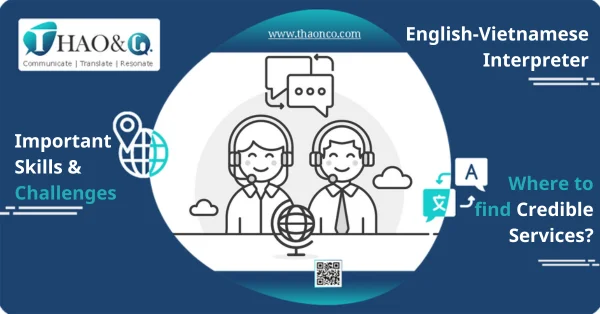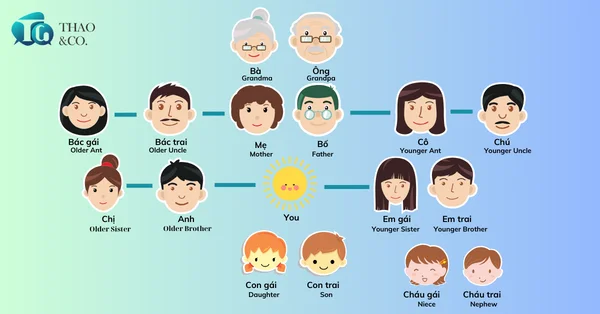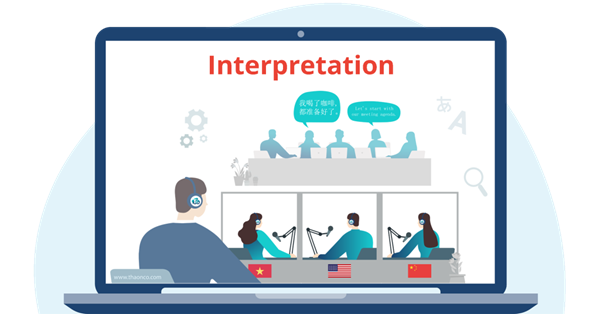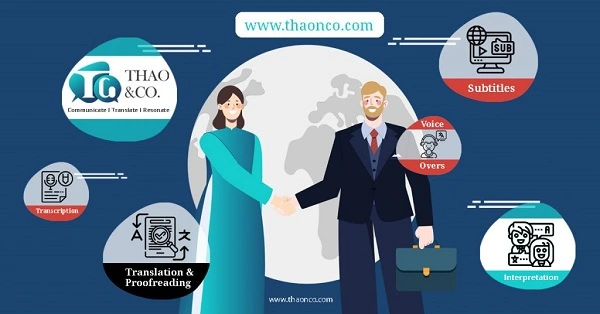In the modern era of economic globalization, English-Vietnamese interpretation services have become indispensable. The field of interpretation, especially the specialization in English to Vietnamese, requires interpreters exhibit not only superior language capabilities but also a variety of additional skills.
Should you be interested in utilizing this service, the subsequent article by Thao & Co. can help you gain insights into its pricing and some assessment criteria for reliable interpretation services.
English-Vietnamese interpretation involves the process of converting spoken content from English to Vietnamese and the other way around. At present, English continues to be the most widely spoken language in the world. As reported by Ethnologue, over 1.5 billion individuals currently use English in their daily lives. For that matter, the demand for English-Vietnamese interpreter services is on the rise to cater to the society needs across various sectors.
Furthermore, English-Vietnamese interpretation is also utilized in industries such as construction and real estate, advertising and marketing, education, finance, etc.

The profession of English-Vietnamese interpretation is popular among language enthusiasts. Success in this career demands interpreters to master the skills listed below:
While interpreting between English and Vietnamese can be a fascinating career, it comes with its own set of hurdles that a professional interpreter must acknowledge and devise strategies to surmount.
To achieve distinction in interpretation, an interpreter must couple his/her foreign language skills with a deep appreciation for the cultural contexts of the countries in question. This is because the cultural and historical differences between the two countries have a considerable influence on the process of interpretation.
The interpreter must meticulously evaluate the context to select suitable terminology. English-speaking countries typically favor straightforward expressions, whereas Vietnamese communication tends to be more subtle and nuanced in conveying desires.
The pronounced differences between Vietnamese and English pose numerous challenges for interpreters. Vietnamese features an extensive system of personal pronouns and forms of address, including terms like “tôi,” “em,” “anh ấy,” “cậu ấy,” “dì,” “chú,” and others. Each term is indicative of the speaker’s emotional subtleties and the nature of his/her relationship with the people involved.

Conversely, English employs a relatively limited set of personal pronouns, including “I,” “you,” “they,” “we,” “she,” “he,” and so on. As a result, interpretation from English into Vietnamese can often appear coarse and lose the natural flow of the original. Similarly, when interpreting from Vietnamese to English, the sentences may lack the emotional subtleties inherently present in the Vietnamese language.
Furthermore, the usage of function words in Vietnamese can significantly alter the sentence’s meaning. Take, for instance, the difference between “Cô ấy chỉ mua hoa” (She only buys flowers) and “Cô ấy mua hoa” (She buys flowers). The inclusion of the function word “chỉ” (only) in the sentence informs the listener that the emphasis is on the exclusivity of the action performed by the subject, rather than on the object of purchase.
A subtle variation in word choice can substantially impact the meaning conveyed. Hence, interpreters will face significant challenges when converting text into a language with fewer function words, such as English, since all nuances included must be precisely captured.
Specialized sectors such as medicine, engineering, and law demand interpreters to have a profound understanding of the field to ensure accurate interpretation. These areas are replete with specialized terminology that can be challenging to find in standard dictionaries.
In the realm of medical interpretation, it is essential for interpreters to obtain credentials from esteemed institutions such as the National Board of Certification for Medical Interpreters (NBCMI) or the Certification Commission for Healthcare Interpreters (CCHI).
Interpreters are required to maintain strict accuracy within a very limited time frame and bear a substantial psychological load from the significance of local and global events. Thus, to thrive in this sector, interpreters must possess the resilience to handle such high-pressure situations.
The use of machine English-Vietnamese interpreting has both advantages and disadvantages that clients need to consider before using.
Utilizing machine interpretation machine provides the perk of rapid interpretation, especially for basic and commonly used sentences in daily communication. Moreover, it offers the convenience of time and cost efficiency for all involved parties.
Yet, machines are merely tools for assistance. The use of machine interpreting is fraught with risks as it lacks the capability to fully comprehend the context and the speaker’s intended meaning. This shortfall can frequently result in incorrect and ambiguous interpretations, ultimately causing interruptions in the flow of communication.
For critical situations of medical, conference, or legal interpretation, it is advisable to seek professional English-Vietnamese interpreters to guarantee precision and maintain the formality required for such events.

Many clients of ours express interest in the cost of English-Vietnamese interpreter services. However, pinpointing an exact overall price is challenging due to various factors that influence the final amount. These factors include, but are not limited to, the following:
If you are seeking a professional and credible English-Vietnamese interpretation service provider, Thao & Co. is a reliable option to consider. Our team of native linguistic experts is meticulously recruited and screened for their expertise and competence. All of our linguists have extensive experience in specific industries and possess high professional qualifications.

Furthermore, the operational process on our proprietary platform is also a notable advantage compared to other translation and interpretation agencies.
Our clients will receive a personal account to access a client-customized Dashboard. Through this Dashboard, you can effortlessly track the progress of your projects, provide reference documents, review project quotations, and monitor payment status. Rest assured, our platform ensures the utmost security for all your information.
For events that require the involvement of many interpreters, we offer an Interpretation Guidelines service to guarantee accuracy, consistency, and professionalism throughout the interpretation process.
Our Project Manager will discuss with you to figure out the nature and specific requirements of your event. Subsequently, we will liaise with the Interpreter Team Leader to establish a set of expected professionalisms, compile a comprehensive glossary, and prepare essential remarks for the interpreting project. Additionally, we conduct training sessions to disseminate this information among the interpreter team to ensure their proficiency and adherence to the established guidelines.
Let’s discover how Thao & Co. successfully managed the interpretation project for the event “Wines of Portugal – Taste and Feel”, a wine-tasting event utilizing up to 14 interpreters.
The preceding information sheds light on the challenges within the English-Vietnamese interpretation profession, as well as the pricing and essential skills required for interpreters.
For more information about our English-Vietnamese interpretation services, please fill out the Get a Quote Form. Our team of experts at Thao & Co. will then swiftly get in touch with you and offer detailed consultation including information about rates as well as the range of services suitable for your project(s).